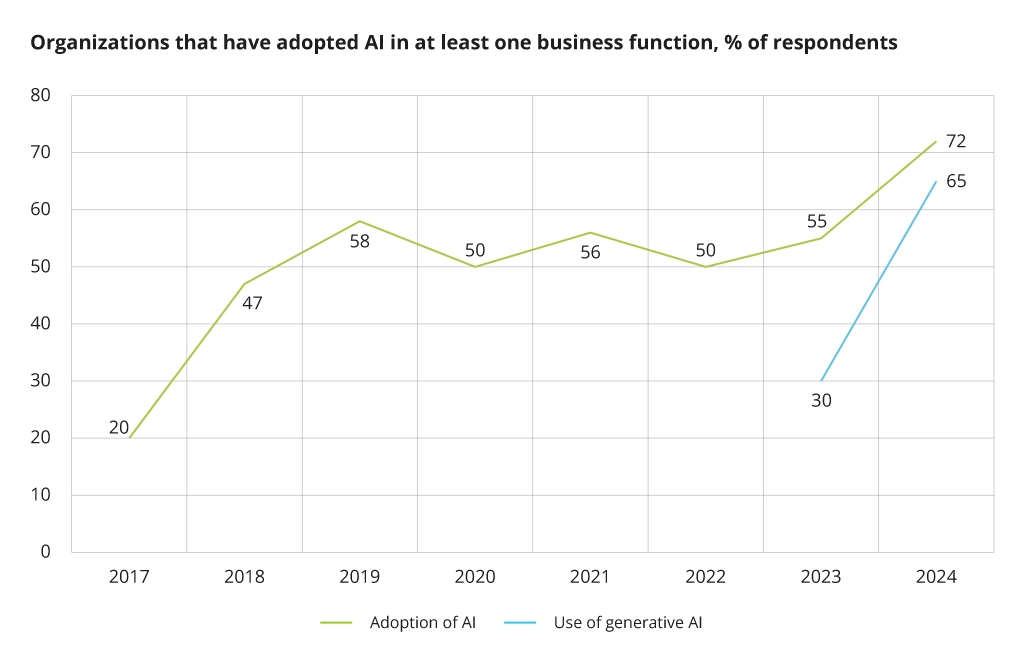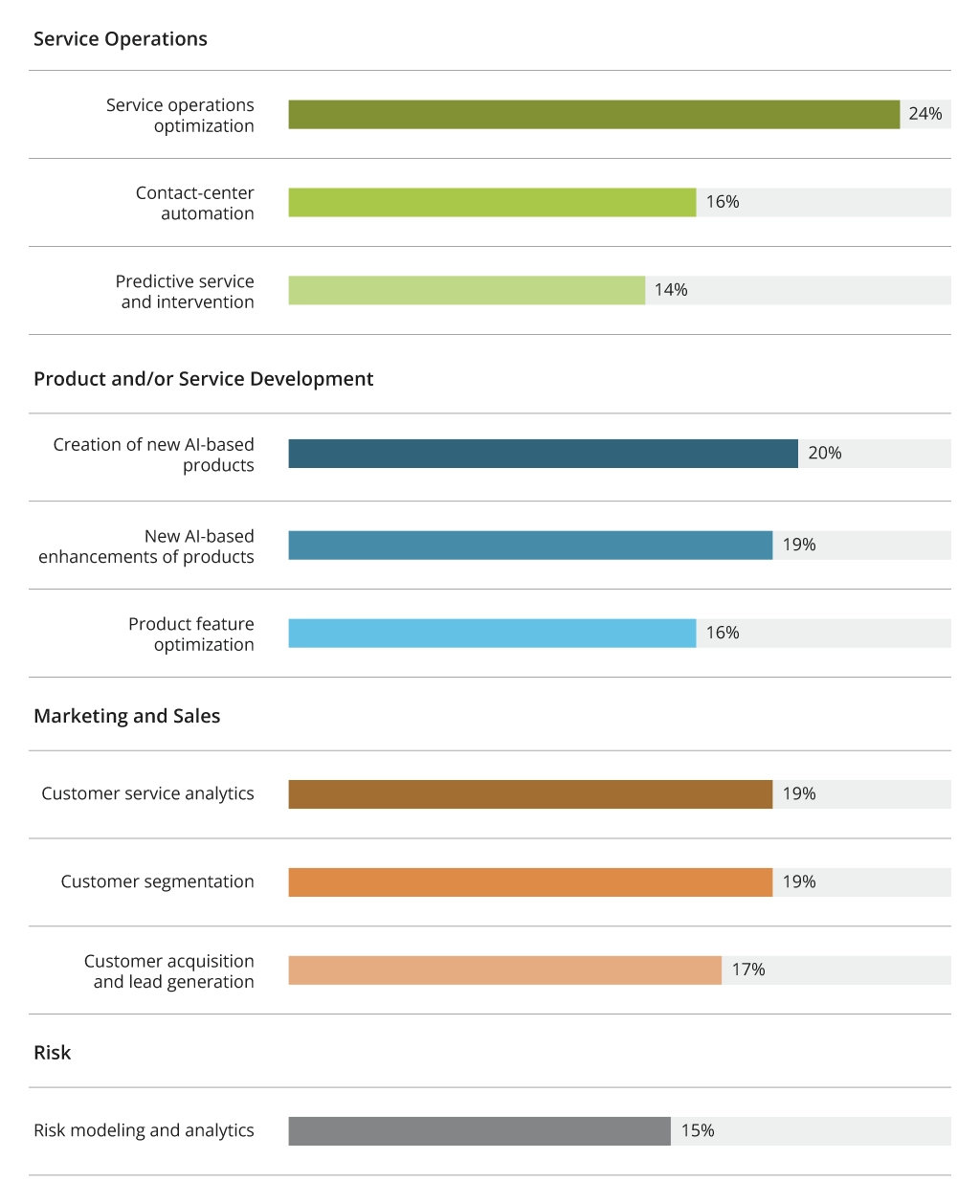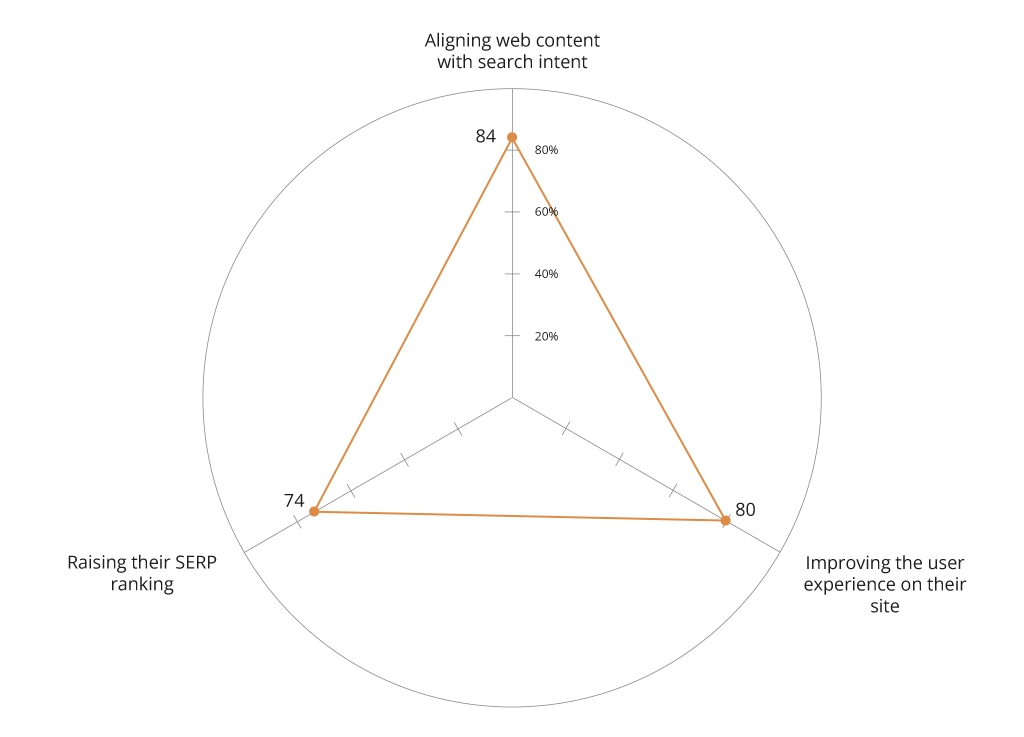How to Utilize AI for Customer Acquisition
Machine learning, a subset of AI, enables marketers with advanced customer segmentation capabilities. By automatically categorizing customers based on habits and preferences, it takes segmentation to the next level. The yearly McKinsey report highlights almost a 72% worldwide in at least one business function. This trend is further supported by the survey results, where respondents report allocating more than 20% of their digital budgets to analytical AI, providing evidence for the technology’s impact on customer acquisition and CX.
AI for customer acquisition strategies unlocks higher response rates at lower costs, eliminating non-buyers from the acquisition funnel and targeting high-value prospects. Statista predicts the global AI market will reach a phenomenal $740 billion USD by 2030, reflecting a compound annual growth rate of 17.3%.
What’s more, AI's potential for disruption extends far and wide. From optimizing inventory management system and supply chain to reimagining customer experiences with virtual assistants in telecom . AI is transforming diverse industries. But the true power of artificial intelligence lies in its ability to revamp customer acquisition.
By harnessing five key areas – predictive behavioral analytics, improved prospect segmentation, personalized outreach, cross-selling with AI-powered recommendations, and enhanced customer experience – businesses can attract new customers and create remarkable journeys built on loyalty. Let’s take a closer look at some common use cases of AI adoption.
1. Predictive Behavioral Analytics
As tracking tools evolve and become more complex, it is easier than ever to track visitors’ actions on your website and use those business intelligence insights to reach out to potential customers. It goes further than that.
Advanced analytics gives businesses a crystal-clear view of customer behavior. But what about emotions? 95% of consumers check online reviews, and positive perceptions translate to higher spending, 58% are willing to pay more.
This is where AI sentiment analysis comes into play. It analyzes text data (reviews, social media) to understand customer feelings and identify trends. Businesses can then leverage this to improve customer service and enhance satisfaction and loyalty.
Taking it a step further, the Internet of Things (IoT) generates valuable data on customer habits through connected devices. AI can interpret this data, predicting needs and recommending products – imagine a smart fridge suggesting replacements or compatible accessories.
By integrating these AI advancements, businesses gain a holistic understanding of their customers, predicting not just immediate desires but also long-term preferences.
A case from our experience: Predictive behavioral analytics goes beyond clicks and online browsing history. AI in brick-and-mortar stores, like in our project with a major Asian retailer, uses computer vision to analyze customer movement (heatmaps) and dwell time. This data can be used to predict future in-store behavior, optimize store layout for better customer flow, and even trigger personalized recommendations based on real-time customer actions.
2. Improved Prospect Segmentation
AI can help businesses target a specific audience without human bias. It analyzes vast datasets objectively, uncovering hidden patterns, and segmenting prospects based on relevant criteria.
Traditional methods often miss crucial customer details. AI can analyze website behavior, purchase history, social media activity, and even anonymized sensor data to create a 360-degree view of your ideal customer. This thorough understanding opens the doors for laser-focused targeting.
The future of segmentation is even brighter. AI advancements like natural language processing (NLP) will enable real-time analysis of customer conversations, providing deeper insights into their wants and likes. It would be possible to tailor marketing messages based on a customer's specific questions or concerns expressed during a live chat session.
Read more about NLP capabilities for optimizing business processes.
Case in point: BECU, a credit union, used AI to personalize email campaigns. Partnering with data provider MX, they unlocked "intelligent data" - – customer information fortified with AI insights. This data went into their marketing platform, resulting in targeted emails that engaged customers on a personal level and increased loan applications by 10%. A case like this is a perfect job for AI that acts as a data detective, discovering hidden patterns and preferences.
Here are other AI use cases for marketing:
3. Personalized Outreach
Imagine a world where marketing feels relevant, not intrusive. With an average person bombarded by 10,000 ads daily (most irrelevant), digital fatigue is real. AI can be the antidote.
Artificial Intelligence analyzes vast customer data to help marketers identify themes that resonate with different groups. Not content alone, machine learning analyzes interactions across channels (email, social media, website) to understand their unique likings. You can always go deeper with this technology. For example, AI can automate A/B testing across channels and optimize outreach in real-time. Plus, ML algorithms continuously parse results, refining your customers’ journeys for a seamless experience.
Case in point: Georgia Aquarium utilized AI to personalize outreach to visitors and sponsors for their marine wildlife conservation programs. A near 90% increase in email open rates, a 6% improvement in engagement, and a 21% sales spike through digital channels were the results of their data-centric strategy. The bottom line: highly targeted content and compelling messages do resonate with each audience segment.
4. Cross-Selling and AI-Based Access to Add-on Services and Solutions
Studies consistently show that retaining existing customers is significantly more cost-effective than acquiring new ones. Like a research by Frederick Reichheld of Bain & Company (the inventor of the net promoter score), suggesting that a mere 5% increase in customer retention can boost profits by 25%. How can AI help with that? It captures a wealth of data, from purchase history to browsing behavior, and social media activity, and identifies trends and aha-moments for tailored cross-selling strategies.
ML algorithms are effortlessly apt at sifting through user data to predict future behavior, like churn risk and propensity to purchase specific add-on services. And of course, it learns continuously, meaning that cross-selling efforts remain dynamic and cater to the evolving needs of the customer base.
Case in point: Hospitality giant Hilton benefits from AI through its smart chatbot, Xiao Xi, by personalizing guest experiences. Analyzing data from its 5,500 hotels, Hilton tailors its services and anticipates consumer needs. Xiao Xi, available 24/7, enjoys a 94% satisfaction rating and saves the company $1 million annually in customer service costs. In addition to this, it suggests recommendations and encourages direct bookings.
5. Customer Experience
Artificial intelligence is upgrading customer experience with personalized, efficient journeys, yes. Today's AI-powered assistants and chatbots offer 24/7 support, answer complex questions, and handle simple transactions. According to a Gartner report, customer-led AI is the future of self-service. This means AI anticipates customer needs and guides them proactively through the touchpoints, exceeding expectations. But the more exciting player, generative AI, offers unthought-of potential to marketers. Gen AI is already being used to draft marketing materials. However, the applications extend beyond creative copy, with this tech being explored for real-time personalization. By analyzing user data and preferences, Gen AI can dynamically generate content and experiences tailored to individual users, fueling a transition from pre-defined options to a user-centric customer journey.
These insights and an extra pair of hands help your team shape the user acquisition strategy and allocate marketing funds to the channels with the greatest influence on your growth goals.
A case from our experience: Take a massive EU oil and gas e-procurement platform serving thousands of users. They were dealing with a typical challenge of endless support requests. Infopulse's AI chatbot solution, built with advanced NLP, solved that problem. It now handles 75% of user requests instantly, with features like 10x-reduced setup time and 100+ languages support.
Final Thoughts
AI for customer acquisition is rewriting the rules of the game. By wielding powerful tools like predictive analytics, segmentation, personalization, and smart recommendations, businesses can attract high-value prospects and cultivate loyal customers. From in-store heatmaps to Gen AI marketing materials, AI offers a comprehensive arsenal for building exceptional customer journeys.






![CX with Virtual Assistants in Telecom [thumbnail]](/uploads/media/280x222-how-to-improve-cx-in-telecom-with-virtual-assistants.webp)

![Digital Customer Engagement in Banking [thumbnail]](/uploads/media/a-complete-checklist-for-enhancing-digital-customer-engagement-in-banking-280x222.webp)




